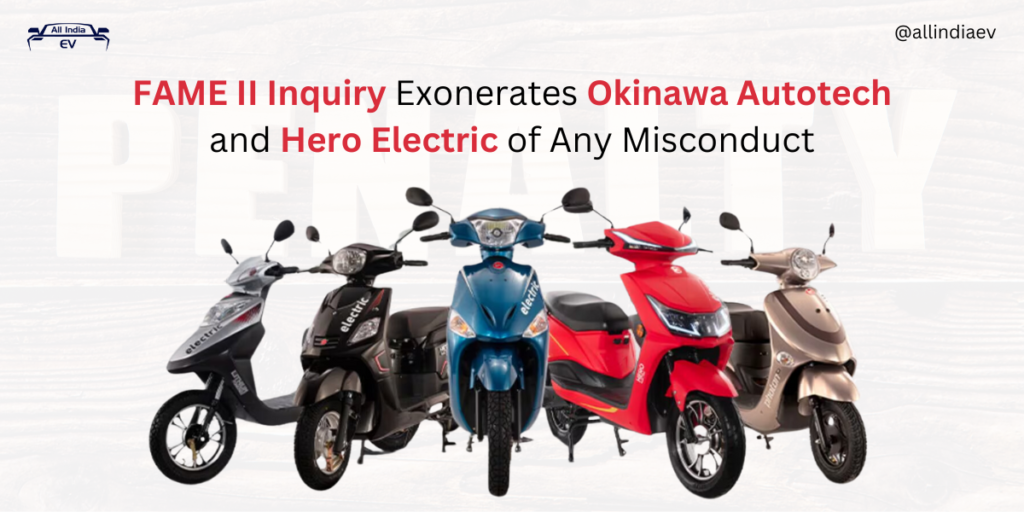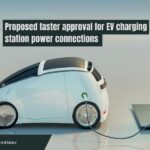
FAME II Inquiry Exonerates Okinawa Autotech and Hero Electric of Any Misconduct
The Ministry of Heavy Industries (MoHI) has wrapped up its inquiry into claims that Okinawa Autotech and Hero Electric misused subsidies under the FAME II Scheme. The results alleviate the burden on two-wheeler manufacturers by clarifying the intricacies of the Phased Manufacturing Programme (PMP) regulations.
According to a report by Business Today TV, the Automotive Research Association of India (ARAI) found in its review on May 13, 2022, that Hero Electric Vehicles Private Ltd. used locally sourced or assembled components, with no signs of any Phased Manufacturing Programme (PMP) breaches. Additionally, a combined assessment by ARAI and the International Centre for Automotive Technology (ICAT) determined in their report, dated August 8, 2022, that Okinawa Autotech had completed full localization by May 31, 2022.
The report highlighted the confusion caused by unclear directives on indigenization and localization within the FAME II policy notifications and Phased Manufacturing Programme (PMP) guidelines. This lack of clarity has perplexed various stakeholders, including the Ministry of Heavy Industries. The committee pointed to the Ministry’s Auto Division for releasing ambiguous and conflicting notifications and guidelines related to FAME II. This has led to uncertainties among Original Equipment Manufacturers (OEMs) and testing agencies, potentially resulting in varied interpretations.
The committee suggested that a different third-party agency, not ARAI or ICAT, should check whether all Original Equipment Manufacturers (OEMs) are following PMP guidelines. They pointed out that there have been inconsistent reports about whether OEMs meet the standards or not. There were also issues with how testing agencies applied the rules when investigating different OEMs based on complaints, leading to some OEMs being approved and others still being examined.
Accusations and Resolution Okinawa Autotech and Hero Electric were initially accused of breaking PMP rules and wrongly using subsidies worth Rs 249 crore. However, after a detailed review, a committee set up by the Ministry cleared both companies of any wrongdoing.
Investigation Process and Results
The investigation involved a detailed look at the operations of the companies. Insights from the Automotive Research Association of India (ARAI) and the International Centre for Automotive Technology (ICAT) were crucial. ARAI confirmed that Hero Electric sourced and assembled locally, while Okinawa Autotech met the localization requirements by the deadline.
Confusion and Recommendations
The investigation showed there was confusion due to unclear policy notifications about FAME II and PMP. The committee blamed this on the Ministry’s Auto Division and suggested having a third party review PMP compliance. It also noted that testing agencies need consistent criteria for evaluations.
FAME II Updates and Incentives
According to a report from July 25, 2023:
✅ Under FAME I, the Ministry approved 520 charging stations.
✅ FAME II led to the approval of 2,877 electric vehicle charging stations in 68 cities across 25 states and territories, and 1,576 stations along 9 expressways and 16 highways.
✅ The Production Linked Incentive (PLI) Scheme for the Automotive Sector, with a budget of Rs. 25,938 crore, promotes domestic manufacturing, including electric vehicles.
✅ GST on electric vehicles has been reduced from 12% to 5%, and on chargers and charging stations from 18% to 5%.
Moving Forward
Improving policy clarity and evaluation processes is crucial moving forward. Consistency will help ensure fair treatment for all OEMs and prevent future misunderstandings. The clearing of charges against Okinawa Autotech and Hero Electric marks a significant step in resolving issues related to subsidy use under FAME II.




